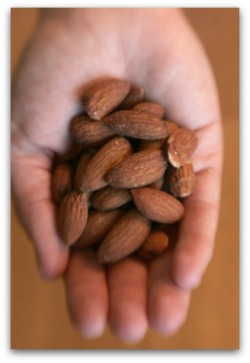- About RTB
- Coach Mark
- Contact Coach Mark
- Matters of the Heart
- Testimonials
- 2021 Team Paws Chicago
- ATHLETICO Phyiscal Therapy: Training Tips & Free Assessments
- 2018 Winter Training Program For Mercy Home Heroes
- Mercy Home Heroes Marathon Training Program
- Calendar of Key Dates & Events
- Program Fees
- MOJI....Products for the Runner
- Get Results
- Medical Advice for Boston Marathoners and ALL Runners
- Locations
- Healthy Eating
- Winter Running Camp
- Tip of the Week
- Bova Bakery
- The Flying Finn
- SUMMER PROGRAM FEES
- Release & Survey
- Winter Training
- Post Boston Celebration
- Coach Mark and Cubs owner
HEART HEALTH: GO NUTS
There is nothing nutty about it; nuts are notoriously high in fat but have the potential to promote heart health. They are full of protein, fiber, healthy monounsaturated fats, vitamins, nutrients and antioxidants. In moderation, they are one of the super-foods. If you are not allergic to them, find some room in your kitchen for this great snack.
Healthy Lifestyle Tip: Go Nuts
Many people avoid nuts, thinking they are too fattening. However, research suggests that nuts can help with weight control. Although nuts are high in calories studies show that, in general, people who eat nuts regularly tend to weigh the same or less than those who do not. For instance, a Spanish study of nearly 9,000 people, found that those who ate nuts at least twice a week were less likely to gain weight over 28 months than those who never or rarely ate nuts.
What is it about nuts? The fiber and protein in nuts help make you feel full for longer, so you are less hungry and presumably eat less often.
Good for your heart? Studies have consistently linked nuts to a reduced risk of heart disease. According to a studies eating about 2 to 3 ounces of nuts most days of the week, in particular almonds, pecans, peanuts and walnuts may significantly lower total and LDL ("bad") cholesterol. In some cases, nuts have been shown to increase HDL ("good") cholesterol.
All nuts are rich in vitamin E, magnesium, protein and fiber but here are some that stand out:
Pistachios are high in cholesterol lowering plant sterols and have more potassium than most nuts
Almonds are richest in vitamin E and calcium
Walnuts are richest in alpha-linolenic acid, a heart-healthy omega-3 fatty acid.
Cashews are richest in copper and zinc
Brazil nuts are the best dietary source of selenium. Just one medium nut a day supplies all you need
Not so nutty advice- Although nuts are healthy and may help you control your weight, don't go overboard; limit yourself to a small handful a day. Make sure that you stick to the raw and unsalted kind.
- The British Nutrition Foundation recommends that if you have a family history of nut allergies you should avoid nuts when pregnant and not give them to children when they are young.
- Always consult with your doctor regarding nut allergies. Also, remember to read the food labels and ingredients
Keep Your Mind Nimble
Healthy Lifestyle Tip: Keep Your Mind Nimble with These 5 Foods
Not a fan of crossword puzzles? Can't get the hang of Sudoku? Don't worry. There's another way you can sharpen your brain: Revise your grocery list. Include the following foods in your regular diet for better brain function and overall health.
Blueberries: Compounds in the bright berries may help to shield against harmful processes linked with Alzheimer's disease and premature brain aging.
Eggs: This breakfast favorite is loaded with selenium; a mineral that could help make your brain years younger.
Mustard: What makes mustard so amazing? Turmeric. Getting just 17 milligrams of it a day, about a teaspoon, can help activate genes that control the cleanup of cellular waste in your brain.
Salmon: This pink fish is a great source of omega-3 fatty acids including the type thought to have the most anti-aging effects on the brain.
Kale: Getting at least three servings a day of dark, leafy greens high in carotenoids and flavonoids can slow the mental decline associated with aging.
Source: RealAge.com
Tip: Eating Right - Which is Better?
Here is some information that will help you avoid some confusion.
Which is better?
Which is better 'whole grain' or 'multi grain'? Answer – you will get more health gains from whole grains.
'Whole grain' means the entire grain kernel has been used to make the product. That's good because its nutritional value survives intact. Foods made with whole grains provide fiber, trace minerals and certain vitamins.
'Multi grain' breads such as 12-grain or 15-grain sound nutritionally impressive, but here's where label reading is a must. Multi grain only means that more than one type of grain was used. It's possible that two or more grains went into the product after they were refined and stripped of their nutritional value. This means most multi grain breads typically offer less fiber and lower amounts of other key nutrients, such as zinc and vitamin E.
No matter how many grains are involved in a multi-grain bread, if the grains have been refined and the bran and germ of the grain have been removed you are missing out on valuable nutrients. So read your labels carefully and look for products with the whole grain stamp.
Source: prevention.com

Who's needs crazy diets and tons of supplements?
Eat smart, eat healthy!
Healthy Lifestyle Tip: Top Ten Super Foods
These foods are considered some of the best bets for healthy eating because they meet at least three of the following criteria:
* Good or excellent source of fiber, vitamins, minerals and other nutrients
* High in phytonutrients and antioxidant compounds, such as vitamins A and E and beta carotene
* May help reduce the risk of heart disease and other health conditions
* Low in calorie density, meaning you get a larger portion size with a fewer number of calories
* Readily available
* From lowering cholesterol, to reducing the risk of cancer, these super-foods are extremely valuable to a healthy lifestyle.
Almonds are packed with nutrients such as fiber, riboflavin, magnesium, iron and calcium. Like all nuts, almonds provide one of the best plant sources of protein. And they're good for your heart. Most of the fat in almonds is monounsaturated fat – a healthier type of fat that may help lower blood cholesterol levels.
Apples are an excellent source of pectin and soluble fiber that can lower blood cholesterol and glucose levels. Fresh apples are also good sources of vitamin C, an antioxidant that protects your body's cells from damage.
Blueberries are a low-calorie source of fiber and vitamin C. Blueberries may improve short-term memory and promote healthy aging.
Broccoli is a good source of calcium, potassium, folate and fiber, and broccoli contains phytonutrients - a group of compounds that may help prevent chronic diseases, such as heart disease, diabetes and some cancers.
Red Beans are full of iron, magnesium, phosphorus, potassium, copper and thiamin. They're also an excellent low-fat, low- calorie source of protein and dietary fiber. Additionally, red beans also contain phytonutrients that may help prevent chronic diseases, such as cardiovascular disease and cancer.
Salmon is an excellent source of omega-3 fatty acids, a type of fat that makes your blood less likely to form clots that may cause heart attacks.
Spinach is high in vitamins A and C and folate. It's also a good source of riboflavin, vitamin B-6, calcium, iron and magnesium. The plant compounds in spinach may boost your immune system and may help keep your hair and skin healthy.
Sweet Potatoes are high in the antioxidant beta carotene. Food sources of beta carotene, which are converted to vitamin A in your body, may help slow the aging process and reduce the risk of some cancers. Sweet potatoes are also good sources of fiber, vitamins B-6, C and E, folate and potassium.
Vegetable Juice has most of the vitamins, minerals and other nutrients found in the original vegetables and is an easy way to include vegetables in your diet. Tomato juice and vegetable juices that include tomatoes are good sources of lycopene, an antioxidant that may reduce the risk of heart attack, prostate cancer and possibly other types of cancer.
Wheat Germ is at the center of a grain of wheat. Though only a small part of the wheat seed, the germ is a highly concentrated source of nutrients, including niacin, thiamin, riboflavin, vitamin E, folate, magnesium, phosphorus, potassium, iron and zinc. The germ also contains protein, fiber and some fat.
You should avoid any of these foods if you are allergic to them.
Source: mayoclinic.com
PS.........# 11....the bonus food......BANANAS!!!!!
Happy and healthy running!
Coach Mark
|
SUGGESTIONS On How To Make It Through The December Holidays. |
Tips Archive
1) Read why you should get your annual physical.
2) Sweet potatoes Road ID
This is the first of Coach Mark's Tip of the Week. | ||||||

